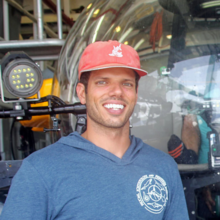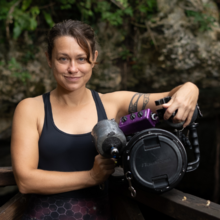Join us for free marine life seminars during REEF Fest! We have a great lineup of guest speakers including scientists, naturalists, and underwater photographers. Seminars are held at the new REEF Ocean Exploration Center (98380 Overseas Hwy., Key Largo, FL 33037). Please see the schedule below for dates and times.
Seminars are free and open to the public, but pre-registration is requested.
Watch Online: For those who are not able to attend in person, REEF Fest seminars will be livestreamed on the REEF Facebook page and YouTube channel.
Seminars and Schedule
Friday, October 17
2:30 pm: "Tracking Shark and Ray Sightings Across the Caribbean: Insights from decades of citizen science data"
Presented by Brendan Talwar, Ph.D., Postdoctoral Scholar at Scripps Institution of Oceanography
Shark and ray populations have seen major declines in recent decades, especially in the Caribbean. In the 2000s, scientists used REEF survey data to reveal these troubling trends. Today, researchers like Brendan have revisited that data (spanning from 1993 to 2024) to better understand how sightings of sharks and rays have changed over time. By analyzing patterns across regions and years, the team has created long-term snapshots of the most commonly seen species. They also explored what happens after countries establish Shark Sanctuaries, where sharks and ray fishing is banned. Brendan will discuss this shark and ray research and highlight how it provides vital insights for conservation, tourism, and sustainable fishing.
4:00 pm: "Participatory Science: A valuable tool for biodiversity research"
Presented by Corey T. Callaghan, Assistant Professor, Department of Wildlife Ecology and Conservation at the University of Florida
Across landscapes and seascapes, citizen science is transforming how we understand biodiversity and the challenges it faces. From backyard birds to coral reefs, millions of observations contributed by the public are helping scientists map species distributions, track migrations and invasions, and monitor environmental change in real time, while also contributing to policy. In this talk, Dr. Corey Callaghan will highlight how these crowd-sourced data streams are reshaping both ecological research and conservation practice. With stories ranging from the global scale to local Florida case studies, he’ll explore how community engagement and open data is increasingly informing biodiversity research.
6:00 pm: "Why I Cave Dive When There’s No Fish: An introduction to the world of cave diving"
Presented by Nat Gibb, Cave Explorer, Underwater Photographer and Videographer
When people hear that Natalie Gibb is a professional diver, they often picture her swimming through blue water over reefs of colorful fish. When they learn that she’s a professional cave diver, the reaction is a blank stare - but she understands this, because she never though cave diving sounded like a good idea until she tried it herself. Captivated by the experience, she moved to Mexico and has spent the past 20 years devoting her life to cave diving and exploration. In this seminar, Natalie will share her imagery, stories, and passion for the dark side of diving.
Saturday, Oct. 18
2:30 pm: "Can Reef Tanks Save Coral? Hobbyists and the future of the healthy ocean"
Presented by Sam Muka, Associate Professor of Science, Technology, and Society at Stevens Institute of Technology
Keeping coral in tanks is a fairly new practice, but it has big implications for the ability to study and conserve coral. This talk will trace the history of coral reef tanks, from the earliest practitioners in Indonesia, to the present. Join us to learn how hobbyists have influenced the design and process of coral conservation over time, and how they continue to contribute to current practices. She'll draw on her expertise from her book "Oceans under Glass: Tank Craft and the Sciences of the Sea," which evaluates the role that aquariums play in how we understand the ocean. Used to investigate an array of scientific questions, from animal behavior to cancer research and climate change, they are a crucial factor in the fight to mitigate the climate disaster already threatening our seas.
Following this seminar, join us for a signing of Sam Muka's book, "Oceans under Glass: Tank Craft and the Sciences of the Sea". Copies are available for purchase during REEF Fest!




